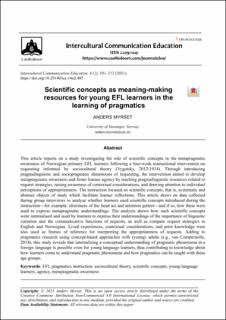| dc.contributor.author | Myrset, Anders | |
| dc.date.accessioned | 2021-09-23T07:33:40Z | |
| dc.date.available | 2021-09-23T07:33:40Z | |
| dc.date.created | 2021-09-22T09:16:59Z | |
| dc.date.issued | 2021-08 | |
| dc.identifier.citation | Myrset, A. (2021) Scientific concepts as meaning-making resources for young EFL learners in the learning of pragmatics. Intercultural Communication Education, 4 (2), pp. 191-212. | en_US |
| dc.identifier.issn | 2209-1041 | |
| dc.identifier.uri | https://hdl.handle.net/11250/2780661 | |
| dc.description.abstract | This article reports on a study investigating the role of scientific concepts in the metapragmatic awareness of Norwegian primary EFL learners’ following a four-week instructional intervention on requesting informed by sociocultural theory (Vygotsky, 2012/1934). Through introducing pragmalinguistic and sociopragmatic dimensions of requesting, the intervention aimed to develop metapragmatic awareness and foster learner agency by teaching pragmalinguistic resources related to request strategies; raising awareness of contextual considerations; and drawing attention to individual perceptions of appropriateness. The instruction focused on scientific concepts, that is, systematic and abstract objects of study which facilitate learner reflections. This article draws on data collected during group interviews to analyse whether learners used scientific concepts introduced during the instruction—for example, directness of the head act and attention getters—and if so, how these were used to express metapragmatic understandings. The analysis shows how such scientific concepts were internalised and used by learners to express their understandings of the importance of linguistic variation, the communicative functions of requests, and compare request strategies in English and Norwegian. Lived experiences, contextual considerations, and prior knowledge were also used as frames of reference for interpreting the appropriateness of requests. Adding to pragmatics research using concept-based approaches with (young) adults (e.g., van Compernolle, 2014), this study reveals that internalising a conceptual understanding of pragmatic phenomena in a foreign language is possible even for young language learners, thus contributing to knowledge about how learners come to understand pragmatic phenomena and how pragmatics can be taught with these age groups. | en_US |
| dc.language.iso | eng | en_US |
| dc.publisher | Castledown Publishers | en_US |
| dc.rights | Navngivelse-Ikkekommersiell 4.0 Internasjonal | * |
| dc.rights.uri | http://creativecommons.org/licenses/by-nc/4.0/deed.no | * |
| dc.subject | pedagogikk | en_US |
| dc.subject | utdanningsvitenskap | en_US |
| dc.subject | EFL | en_US |
| dc.subject | engelsk språk | en_US |
| dc.subject | pragmatikk | en_US |
| dc.title | Scientific concepts as meaning-making resources for young EFL learners in the learning of pragmatics | en_US |
| dc.type | Peer reviewed | en_US |
| dc.type | Journal article | en_US |
| dc.description.version | publishedVersion | en_US |
| dc.rights.holder | © 2021 Anders Myrset. | en_US |
| dc.subject.nsi | VDP::Samfunnsvitenskap: 200::Pedagogiske fag: 280 | en_US |
| dc.source.pagenumber | 191-212 | en_US |
| dc.source.volume | 4 | en_US |
| dc.source.journal | Intercultural Communication Education | en_US |
| dc.source.issue | 2 | en_US |
| dc.identifier.doi | 10.29140/ice.v4n2.485 | |
| dc.identifier.cristin | 1936925 | |
| cristin.ispublished | true | |
| cristin.fulltext | original | |
| cristin.qualitycode | 1 | |

